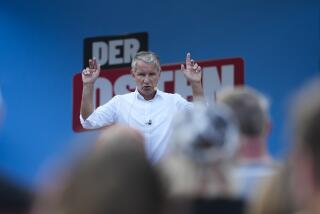By âVoting With Their Feet,â E. Germans Force a Crisis
The exodus of skilled young East Germans âvoting with their feetâ for West Germany had reached alarming proportions. The country was being drained of its best and brightest, of its future, as thousands crossed the open frontier every day. The flood of refugees spelled economic and political disaster for the communist system. What could the government do?
That was 1961. Then the answer was brutal and effective--Stalinist leader Walter Ulbricht, with Soviet cooperation, built a wall dividing Berlin, âto protect the first socialist German state from imperialist subversion.â The East German population was now imprisoned. A few enterprising citizens continued to escape, risking their lives, but the population as a whole settled down with resignation and accepted the inevitable--they were to remain in East Germany. In return, the government ensured them a standard of living unparalleled in other communist countries, albeit far lower than in West Germany. Only the Germans, it seems, have been able to make the communist economic system work.
In the 1970s, the situation in East Germany improved. After Erich Honecker replaced Ulbricht in 1971, relations between the two German states warmed and the government developed a new social contract with the population. Although it remained virtually impossible for anyone below retirement age to travel to the West, East Germans could invite their relatives from West Germany for a visit, they could watch West German television every night, they had greater access to Western consumer goods and the churches were allowed greater freedom. Honecker hoped that, through a mixture of incentives and exiling of opponents, the situation would stabilize.
But that was not to be. As the 1980s wore on, it became clear that the aging East German leadership rejected the liberalization begun in the Soviet Union and other communist countries. While Gorbachev championed glasnost and perestroika, the Politburo in East Berlin clung to the old system, fearing that any change would threaten its already fragile stability. It has banned Soviet publications considered to be potentially destabilizing.
The unpalatable fact that the East German leadership tries to wish away is that there is still no sense of national identity in the German Democratic Republic as it celebrates this week the 40th anniversary of its founding. East Germans think of themselves as German, not East German. They lack the sense of national pride that Poles or Hungarians have, no matter what they think of communism. And since East Germans imbibe the information from West Germany that flickers over television screens every night, they are skeptical about what their media tell them.
As other Eastern European nations have eased their border regulations, East Germans have seized every opportunity. For the first time since 1961, voting with their feet was again possible. Again, the drain of skilled young emigrants threatens an economy that has recently been in decline.
How can the leadership deal with the new exodus? Short of extending the Berlin Wall around the entire frontier or introducing major new repressive measures, their only hope of keeping their citizens and giving them a sense of hope is to introduce political and economic reforms. But the leadership is paralyzed and the leader ailing, very much like the situation in Moscow at the end of the Brezhnev era.
What of the next governing generation? On the face of it, none of the potential successors to Honecker looks like a reformer. There is discontent in the ruling partyâs lower ranks and debate within the leadership, but so far the provincial party bosses look no different from Honecker. And yet who, in 1985, would have predicted that Gorbachev would so quickly challenge so many sacred tenets of Marxism-Leninism and introduce such far-reaching reforms?
The refugee drama of the past weeks has once again highlighted the question of German reunification, because it reminds us of the fragility of the East German state.
German reunification could occur in a number of ways, only one of which would be the resurrection of the Bismarckian Reich. There could be a looser confederation of states, or some larger federal solution within a united Europe. But, whatever oneâs vision of a reunified Germany, it remains a long way off. Gorbachev has made it clear that there will be two German apartments in his âcommon European home.â Germanyâs neighbors, East and West, remain concerned about a German state of 80 million industrious citizens seeking international power commensurate with their economic might. And the leadership in both German states has a certain stake in the current status quo.
The issue today is not reunification, but the continued viability of the East German communist system. Gorbachev has said that the reunification question might be resolved in a hundred years. The East German leadership does not have that much time.
More to Read
Sign up for Essential California
The most important California stories and recommendations in your inbox every morning.
You may occasionally receive promotional content from the Los Angeles Times.









